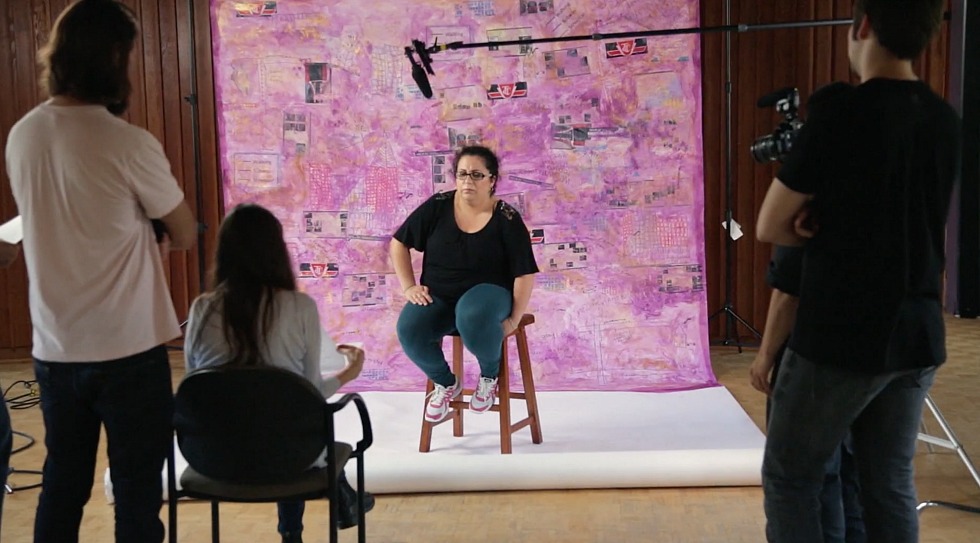New short documentary shines a light on adults with intellectual disabilities

A new short documentary film – part of a research project led by McMaster’s Ann Fudge Schormans – is providing a unique glimpse into the lives of adults with intellectual disabilities living in Toronto and is exploring ways to make the city a more inclusive place.
BY Erica Balch
May 11, 2017
What if you didn’t feel welcome in the city you live in? What if you didn’t feel comfortable, or even safe, going into stores or taking transit? What if, wherever you went, you felt like people were staring at you?
For many of us, that kind of alienation is hard to imagine, but for many people with intellectual disabilities, it’s a part of everyday life.
Now, a short documentary film – part of a research project led by McMaster’s Ann Fudge Schormans – is providing a unique glimpse into the lives of adults with intellectual disabilities living in Toronto and is exploring ways to make the city a more welcoming place.
My Life in the City, screening at the ReelAbilities Film Festival on May 13, follows adults labelled with intellectual disabilities as they share stories, ideas, and a vision for a more inclusive Toronto.
The film grew out of a research project led by Fudge Schormans and co-investigator Rob Wilton, a professor in McMaster’s School of Geography and Earth Sciences, who for the past three years have been working with adults with intellectual disabilities to map their use of spaces in Toronto.
“We wanted to find out how these adults actually live in their communities,” says Fudge Schormans, who along with her research team, worked with 12 adults with intellectual disabilities.
They accompanied the adults on journeys through the city using GPS/GIS technologies, iPads, and cameras to map and capture the spaces they use in their day-to-day lives. Researchers then conducted a series of interviews and workshops using drama-based exercises to find out what they thought about being a person with an intellectual disability living in Toronto.
“We wanted to understand, where do they go? What do they do? Who do they see? Who do they talk to and engage with? Do they feel safe? Who gets to make the decisions about where they go? And are there other places they would rather go? The point of this research was to find that out,” says Fudge Schormans.
The research revealed that while, in most cases, the adults were able to carve out a place for themselves in the city, many had also been the victims of discrimination and even physical violence. Although each adult used and perceived city spaces differently, Fudge Schormans says a common theme emerged: “Very often they don’t feel welcome. They don’t feel like they’re part of the city at all.”
She says the idea to produce a documentary came from the adults themselves. “They said they wanted to make a film that would tell people about their lives,” she says. “They wanted people to think about how to make the city a more welcoming place.”
Fudge Schormans contacted Toronto-based filmmaker Adam Goldhammer who, along with his film crew, worked collaboratively with the adults to create the documentary.
“It was a co-production where everybody brought their own strengths,” explains Fudge Schormans who says Goldhammer’s production team trained two of the adults to assist with camerawork and trained another adult to help with the interviews. A group of the adults also created artwork for the film and worked on the credits.
“We all worked together,” she says. “Adam and I took a lot of direction from the group members themselves. The adults made all the production and editorial decisions together. We deferred to them – this is their work and this is a story they want to tell.”
So far, My Life in the City has screened at the Golden Door International Film Festival in New Jersey and will be screened at the Women and Minorities in Media Film Festival in Baltimore. The film will also be screened at the upcoming Canadian Disabilities Studies Association Conference and for community-based service agencies.
“We want as many people as possible to see this film because people need to start thinking differently about people with intellectual disabilities,” says Fudge Schormans, “This is often a pretty invisible group, but we need to pay attention to them – we need to recognize that people with disabilities have every right to be in the city and should be treated accordingly.”
View the My Life in the City Trailer:


